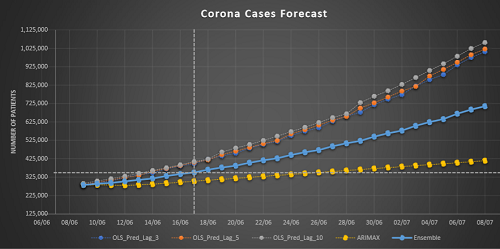India has gone through three long months of national lockdown to mitigate the impact of Coronavirus. Yet the burden of the global pandemic is spiralling in the country. Dr. Soumya Swaminathan, Chief Scientist of WHO says, the virus is here to stay longer and a vaccine could be expected only by 2021-22.
New Delhi (ISJ): India has seen an exponential growth of Coronavirus cases, despite a prolonged lockdown. According to a data scientist, the burden of cases in the country is expected to cross seven lakhs by the end of first week of July. As on 27 June, 2020, the caseload has crossed 500,000, according to data released by federal Ministry of Health and Family Welfare.
World Health Organisation (WHO) says, the virus is going to stay for a long time and any vaccine, currently under trials, would only be available for patients by in the next one or two years.’
“It is likely this virus will stay with us for a long time. It will have to be managed in one way or other. Right now we are using the public health measures to contain it to mitigate the damage,” said Dr. Soumya Swaminathan, Chief Scientist of WHO. She said, just as the humankind is living with many viruses, Coronavirus would become one more, but a manageable one.
Participating in a virtual seminar organised by the government of Kerala, Dr Swaminathan said, traditionally it would take 5-10 years to develop a vaccine for a new disease. Currently, there are 10 vaccines under clinical trial within four months of the discovery of the new virus.
“Realistically speaking, I think we will have results from these trials in the next few months, some of them will go into a larger phase three trials and perhaps by the end of the year, some results and some vaccine doses would be available. But in order to get the hundreds and millions of doses that are going to be needed, we are looking at 2021 or 2022 to be able to vaccinate large number of people,” said Dr. Swaminathan.
On eradication of Coronavirus, the WHO scientist said, at this stage it was very premature to talk about it. The focus of WHO and the global medical community is to reduce the impact of Coronavirus in terms of death and illness, so that there was no disastrous fallout.
Dr. Swaminathan said, a sizeable population were asymptomatic – about 80 percent with mild or moderate symptoms and even they wouldn’t know about the infection. They recover from the illness without any significant morbidity, she added.
“We know this because of the serological surveys that were carried out in some countries, when they take a random sample of population and test them for their antibodies, we know that they were exposed to the virus. So we know many more people were infected in the community, compared to the numbers who get sick and show up in hospitals,” explained Dr. Swaminathan.
Dr. Swaminathan, who was earlier Director General of Indian Council of Medical Research, the apex body for formulation, coordination and promotion of biomedical research in India, said Coronavirus, though is not a dangerous pathogen like Ebola which kills two-third of the infected people, it is dangerous as it can infect millions of people.


